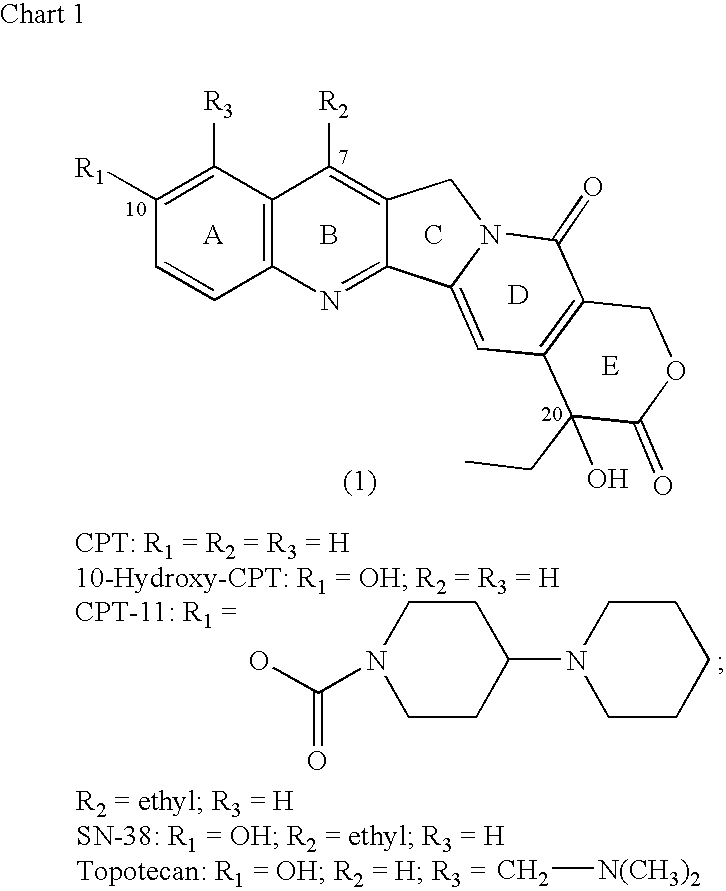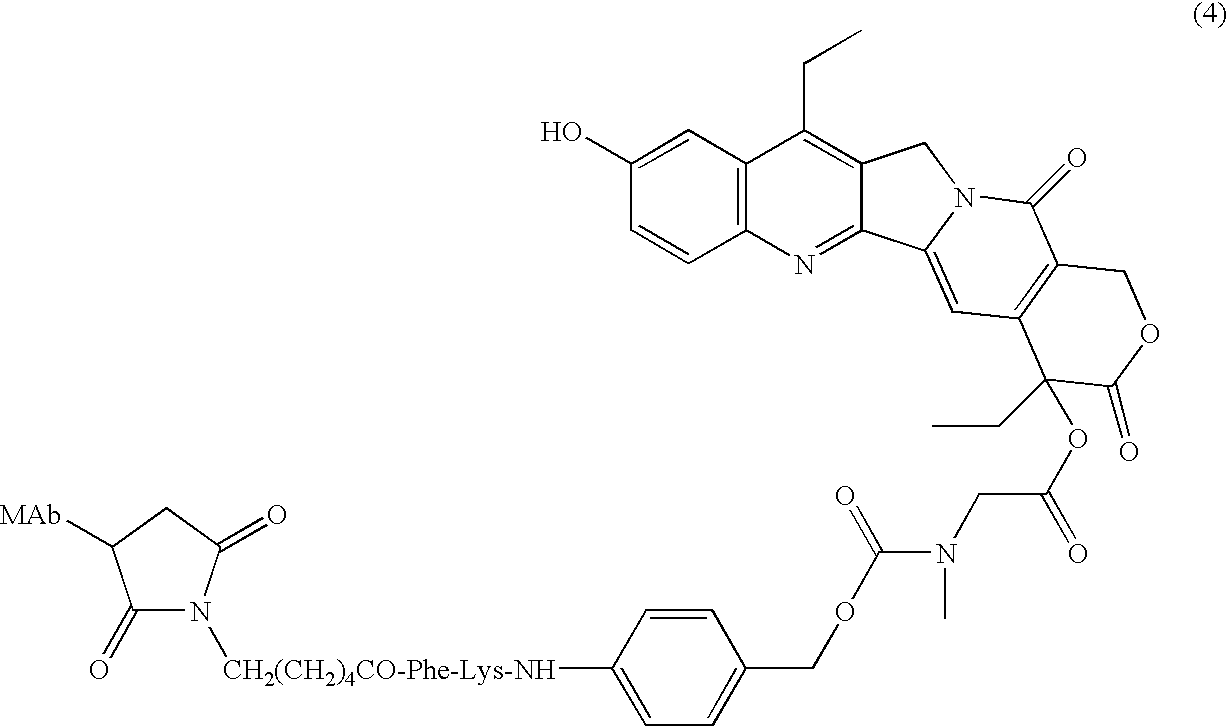Camptothecin-binding moiety conjugates
a moiety conjugate and camptothecin technology, applied in the field of therapeutic conjugates, can solve the problems of reduced antitumor potency of these products, mixed success in cancer treatment, no application in other diseases, etc., and achieve the effect of increasing the avidity of binding
- Summary
- Abstract
- Description
- Claims
- Application Information
AI Technical Summary
Benefits of technology
Problems solved by technology
Method used
Image
Examples
example 1
Preparation of MC-Phe-Lys-PABOCO-20-O-CPT-10-O-BOC; and the Examination of Selective Removal of BOC Protecting Group
[0117] 10-Hydroxy-CPT (0.2307 g) was reacted with di-tert-butyl dicarbonate and pyridine under conditions given in Example 2 below to obtain 10-BOC-O-CPT derivative. The latter (24.7 mg) was treated with 4-dimethylaminopyridine (20.7 mg) and triphosgene (5.9 mg) in anhydrous dichloromethane, and the chloroformate so formed was reacted in situ with equimolar amount of MC-Phe-Lys(MMT)-PABOH for a short duration, typically under 5 minutes. Chromatography on silica gel (230-400 mesh) using methanol-dichloromethane gradient led to the isolation of the title product as a closely eluting mixture with some unreacted starting material. Mass spectrum clearly showed the formation of the product (M+Na at m / e 1376). TFA-mediated cleavage for just two-to-five minutes gave the required BOC-removed product, as shown by time-course analyses by thin-layer chromatography in the 1-7½ min...
example 2
Preparation of MC-Phe-Lys-PABOCO-20-O-SN-38 (‘CL-SN-38’)
[0118] SN-38 (0.5114 g; 1.305 mmol) was reacted with di-tert-butyl dicarbonate (0.307 g) in anhydrous pyridine (8 mL) for 18 h at ambient temperature. The solvent was evaporated, and the crude material was purified by flash chromatography, on silica gel (230-400 mesh) using methanol-dichloromethane gradient, to obtain 0.55 g of pale yellow solid product of 10-t-butyloxycarbonyl derivative of SN-38, BOC-SN-38. This material (0.0358 g) was dissolved in anhydrous dichloromethane (1.5 mL), and treated with 4-N,N-dimethylaminopyridine (DMAP; 26.6 mg) and triphosgene (0.0095 mg) for 7 minutes, and the chloroformate generated, BOC-SN-38-20-chloroformate, was reacted in situ with MC-Phe-Lys(MMT)-PABOH (0.0754 g) for a short duration, typically under 5 minutes. The reaction mixture was then purified by flash chromatography on silica gel (230-400 mesh) using methanol-dichloromethane gradient. Yield: 42.4 mg. A portion of this product (2...
example 3
Preparation of maleimido-PEG12-Phe-Lys-PABOCO-20-O-SN-38 (‘PEG-CL-SN-38’)
[0119] Maleimido-PEG12 moiety was substituted for maleimidocaproyl of Example 2 using commercially available heterobifunctional cross-linker, maleimide-PEG12-NHS ester (see 0040, formula 3), by reacting the intermediate Phe-Lys(MMT)-PABOH in DMF and diisopropylethylamine, to generate the cross-linker maleimide-PEG12-Phe-Lys(MMT)-PABOH. Here PEG12 is a defined PEG substrate containing 12 monomeric units, and was used to increase the solubility of drug-linker intermediate under MAb conjugation conditions. The cross-linker, maleimido-PEG12-Phe-Lys(MMT)-PABOH, was reacted with BOC-SN-38 20-chloroformate of Example 2. Experimental conditions and purifications were analogous to that detailed in Example 2. The product was subjected to TFA-mediated deprotection to obtain the title product. Electrospray mass spectrum showed peak at m / e 1602 (M+Cl) and 1681 (M+TFA) in the negative ion mode and a strong peak at m / e 1568 ...
PUM
| Property | Measurement | Unit |
|---|---|---|
| pH | aaaaa | aaaaa |
| pH | aaaaa | aaaaa |
| pH | aaaaa | aaaaa |
Abstract
Description
Claims
Application Information
 Login to View More
Login to View More - R&D
- Intellectual Property
- Life Sciences
- Materials
- Tech Scout
- Unparalleled Data Quality
- Higher Quality Content
- 60% Fewer Hallucinations
Browse by: Latest US Patents, China's latest patents, Technical Efficacy Thesaurus, Application Domain, Technology Topic, Popular Technical Reports.
© 2025 PatSnap. All rights reserved.Legal|Privacy policy|Modern Slavery Act Transparency Statement|Sitemap|About US| Contact US: help@patsnap.com



